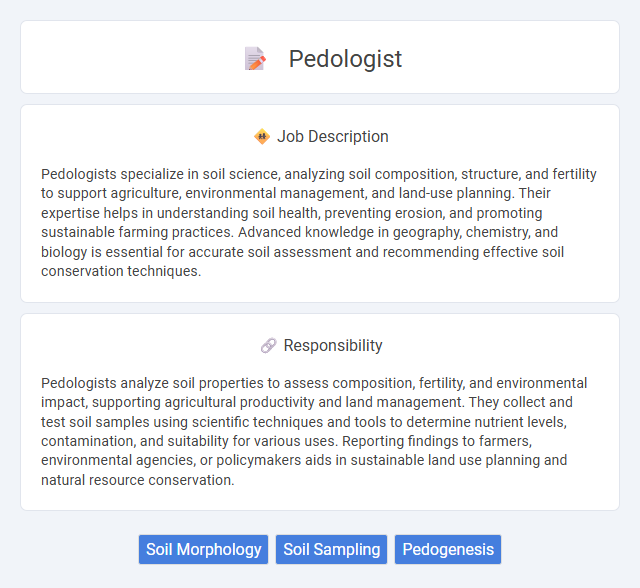
Pedologists specialize in soil science, analyzing soil composition, structure, and fertility to support agriculture, environmental management, and land-use planning. Their expertise helps in understanding soil health, preventing erosion, and promoting sustainable farming practices. Advanced knowledge in geography, chemistry, and biology is essential for accurate soil assessment and recommending effective soil conservation techniques.
Individuals with a strong interest in soil science and environmental conditions are likely suitable for a pedologist career, given the demanding nature of fieldwork and laboratory analysis. Those who prefer consistent indoor settings or have limited physical stamina may find the job challenging. The role probably requires patience, attention to detail, and a comfort with outdoor environments to succeed.
Qualification
A pedologist must hold a degree in soil science, environmental science, or geology, often complemented by specialized training in soil classification, analysis, and mapping. Professional certifications such as Certified Professional Soil Scientist (CPSS) enhance credibility and career prospects. Advanced coursework in agronomy, chemistry, and geography is essential to understand soil properties and their impact on ecosystems.
Responsibility
Pedologists analyze soil properties to assess composition, fertility, and environmental impact, supporting agricultural productivity and land management. They collect and test soil samples using scientific techniques and tools to determine nutrient levels, contamination, and suitability for various uses. Reporting findings to farmers, environmental agencies, or policymakers aids in sustainable land use planning and natural resource conservation.
Benefit
A career as a pedologist likely offers significant benefits in understanding soil's role in agriculture and environmental management. This job probably enhances skills in soil analysis, promoting sustainable land use and contributing to food security. Pedologists might find professional fulfillment through research that aids ecological conservation and supports climate resilience initiatives.
Challenge
The job of a pedologist probably involves complex challenges related to soil analysis and interpretation, requiring a deep understanding of soil composition and behavior under varying environmental conditions. Managing unpredictable natural factors and integrating data from diverse sources likely demands strong problem-solving skills and adaptability. Pedologists might frequently encounter difficulties in balancing agricultural needs with environmental sustainability, making their role critical in soil conservation and land management efforts.
Career Advancement
Pedologists analyze soil properties to support agriculture, environmental conservation, and land use planning, gaining expertise in soil chemistry, biology, and physics. Career advancement opportunities include roles such as Senior Pedologist, Soil Scientist, or Environmental Consultant, often requiring advanced degrees and certifications like Soil Science Society of America credentials. Continuous professional development in GIS technology and data analysis enhances prospects for leadership positions in research institutions, government agencies, and private industry.
Key Terms
Soil Morphology
Pedologists specialize in soil morphology, analyzing soil profiles to understand their physical structure, color, texture, and composition. Their expertise in soil horizon differentiation aids in land use planning, agriculture, and environmental management. Accurate soil morphology assessment supports sustainable soil conservation and effective nutrient management strategies.
Soil Sampling
Pedologists specializing in soil sampling analyze soil properties to assess fertility, composition, and contamination levels for agricultural, environmental, and construction purposes. They employ advanced techniques like soil coring, augering, and grid sampling to collect representative soil samples at various depths and locations. Accurate soil sampling conducted by pedologists ensures reliable data for soil classification, nutrient management, and land-use planning.
Pedogenesis
Pedologists study soil formation processes, known as pedogenesis, to understand soil development, classification, and distribution. Their work involves analyzing physical, chemical, and biological factors influencing soil genesis, including climate, parent material, topography, organisms, and time. Insights from pedogenesis research guide sustainable land management, agriculture, and environmental conservation.
 kuljobs.com
kuljobs.com